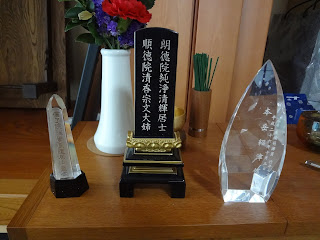Most Japanese have
their funeral in the Buddhist way. After the funeral we make a Buddhist
memorial tablet which is inscribed with the deceased person’s name, the
posthumous Buddhist name and the date of passing away. The middle tablet in the
photo is a traditional wooden type. This is for my grandparents.
Two years ago, my father passed away. I am not
sure if I am a Buddhist or not, but I made a memorial tablet for my father from
tempered glass, the right tablet in the photo. This is not a common traditional
style.
One day a priest from my town came and chanted
a sutra for my father. He complained about this tablet, saying:
“Fifty years from
now, you need to bring the tablet to a temple. This kind of tablet will cause a
problem. A wooden tablet can be burnt while chanting a sutra in the temple but
this type cannot be burnt. We have to put the tablet into the garbage bin.”
I couldn’t consider that point, but the priest
also complained like this:
“These days, it is
difficult to make a bonfire in my temple. The neighbors complain about the fire
and smoke.”
Fifty years from now, what kind of fate awaits
the glass tablet. Anyway neither the priest nor I have any power to do
something to the tablet in the future.
By the way, my family has another transparent
memorial tablet, on the left of the photo. It was made in 1924. Maybe my
grandfather made it for my great grandparents. My grandfather was a teacher of
Western history. He loved Western culture. During WWⅡ, he taught his students like this:
“You assume Japan
will win this war, but I assert Japan will lose.”
After that he was
arrested and scolded by the police. He passed away a few months before the end
of the war so I never met him.
At least he left me this transparent tablet. I
showed the tablet to the priest. He couldn’t complain about this almost one
hundred year-old tablet. He said:
“If it is your
family tradition, it is OK.”





